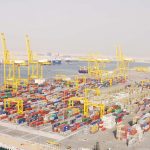HJ Heavy Industries announced on Dec. 30 that it has obtained design concept approval for an 88,000㎥ class very large ammonia carrier (VLAC) from the UK-based Lloyd’s Register (LR). This approval marks a crucial step in the company’s efforts to lead the market in decarbonization ship technology.
The journey began last July when HJ Heavy Industries and Lloyd’s Register signed a memorandum of understanding (MOU) to jointly develop the next-generation VLAC. Over the past six months, both organizations have focused intensively on research activities to bring this project to fruition. The result is a design that meets all the design load conditions required by the classification society, showcasing HJ Heavy Industries’ accumulated technological capabilities from its previous work on eco-friendly ships such as LNG dual-fuel (DF) and methanol-powered container ships.
Ammonia is gaining attention as a clean alternative fuel because it does not produce carbon dioxide emissions when burned. This makes it an attractive option for reducing the carbon footprint of maritime transport, aligning with the International Maritime Organization’s (IMO) “2050 Carbon Zero” initiative, which aims to cut shipping emissions by at least 50% by 2050 compared to 2008 levels.
With the concept design approval in hand, HJ Heavy Industries plans to actively respond to the growing demand in the decarbonization ship market. The company is preparing for an increase in orders by further developing ammonia propulsion carriers. Yoo Sang-chul, CEO of HJ Heavy Industries, emphasized the importance of this development, stating, “The development of eco-friendly fuel-powered container ships to respond to the International Maritime Organization’s ‘2050 Carbon Zero’ initiative is leading to orders and receiving positive responses in the market.”
Yoo also highlighted the company’s future plans, saying, “We will secure technological capabilities through continuous research and development of decarbonization ships such as carbon capture and storage technology, hydrogen ships, and liquefied carbon dioxide carriers to lead the eco-friendly ship market.”
Source: BusinessKorea






